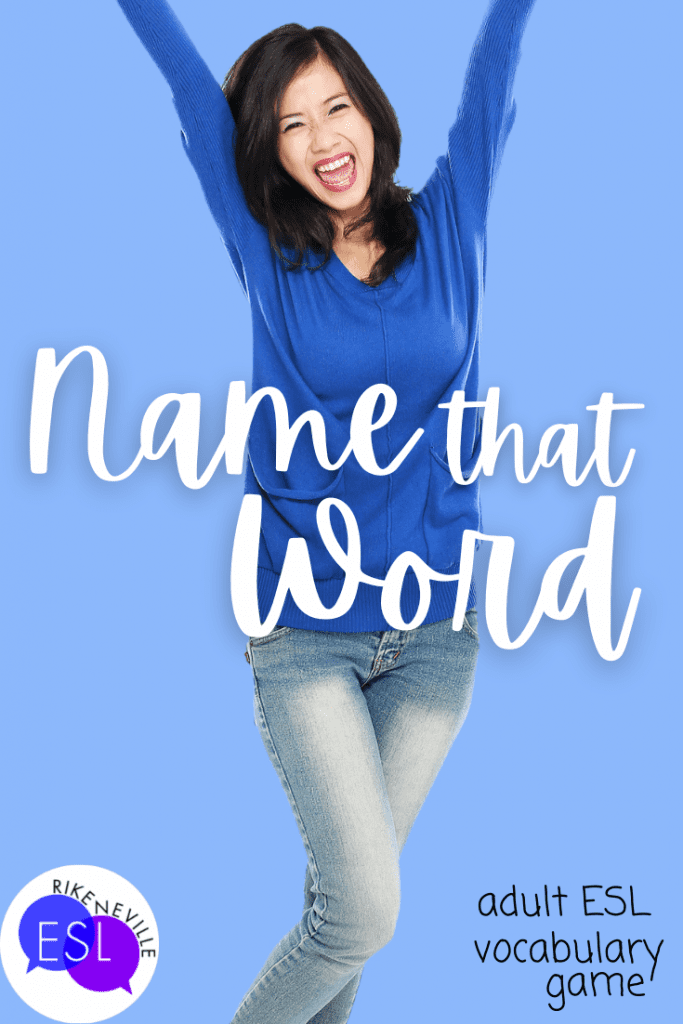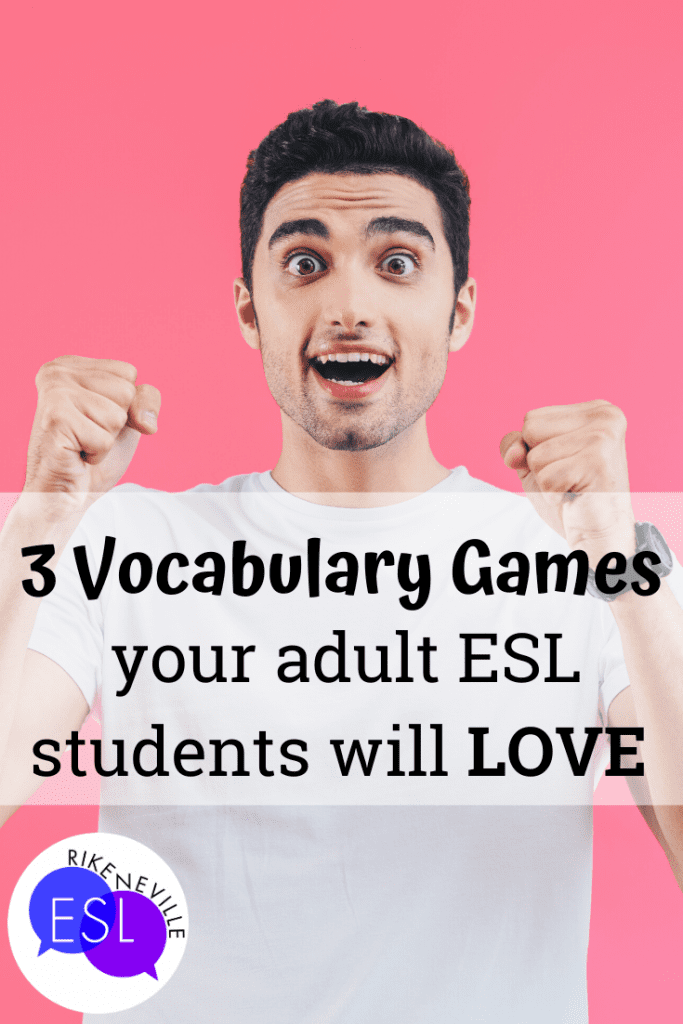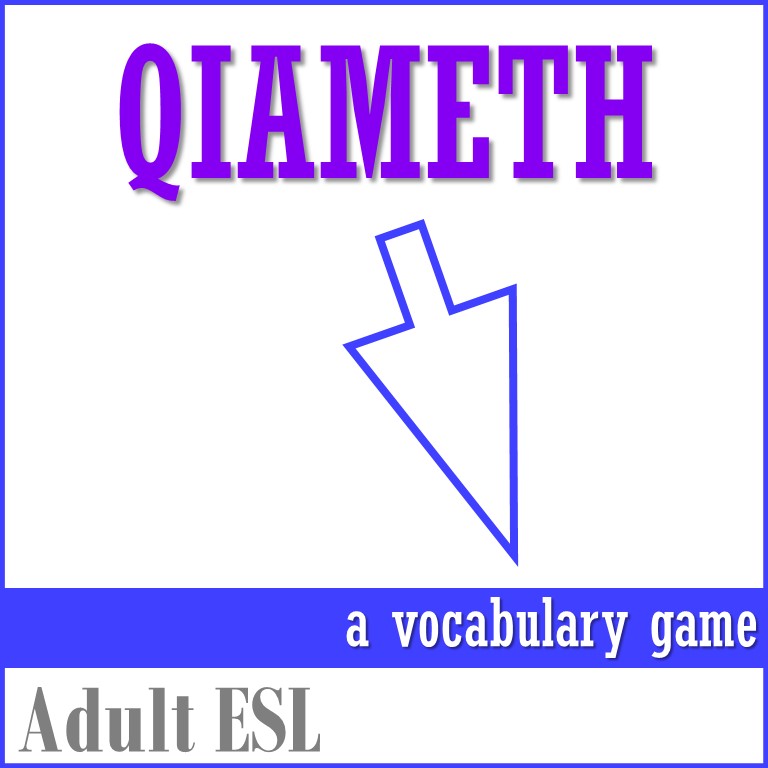
“GAME.”
When I say “game” in my adult ESL vocabulary classroom, the air crackles. Spines extend, eyes brighten, pulses increase.
“GAME” they repeat to each other, and smiles break out.
I smile, too, knowing that the next words out of my mouth have already grabbed their complete attention before even being spoken.
I doubt I need to sell you on all the pros for playing games in the adult ESL classroom, so let’s get right down to three of my favorite fun vocabulary games.
Fun Vocabulary Games for Adult ESL Classes
#1: Sole Survivor

What I love about this fun vocabulary game: Any excuse to get my adult ESL students up and moving, even just a little bit, always makes me happy. Plus, all you need is a ball or stuffed toy—no other prep needed!
Vocabulary Theme: ALL of them!
Groupings: You can set up this fun vocabulary game with small groups, big groups, or even the entire class.
Preview: Give students a theme, any random theme or category, and have them call out vocabulary words that could fit in there. For example, with a color theme, depending on the students’ level, they might call out: red, purple, silver, beige, amber, primary, hue, shade, etc. Other examples: red things, things you can find in the kitchen, things you wouldn’t want to step in, sounds you hear at night, ways to move, etc.
How to play
- Announce a vocabulary theme or category and toss the ball (or small plush toy) to a student.
- The student must say a word that belongs in that theme/category and then toss the ball to another student. Repeat.
- If someone cannot think of a word, she/he is out and must sit down. Then that person becomes a double-checker. The double-checker must listen carefully to ensure that no one repeats a word.
- When everyone has become a double-checker, and only one student remains standing, she/he is named the Sole Survivor and winner of the game.
NOTE: Give a time limit for students to give their answers. Make it a little longer for lower levels, but remember that the faster-paced the game is, the more fun it is. Instead of using a long time limit with your beginners, consider giving them Second Chances or even Third Chances. I sometimes keep track of these by simply writing their name on the board, but it’s generally more fun to give each student slips of paper labeled “Second Chance” and “Third Chance” that they can turn in when they need it. This keeps the game fast-paced.
OPTION: When a student catches the ball, she/he must give a word that fits the given theme and then give a new theme for the next person. This is much more difficult as students cannot think of an answer ahead of time as they won’t know what the theme is, so keep this for your intermediate to advanced students. To ease up the pressure, you can have only every other student give a new theme/category, or every third student (and so on).
#2 Name that Word

What I love about this game: No one EVER gets a class of adult ESL students with perfectly matched language skills. This game makes it possible for the teacher to differentiate by giving more difficult words to more advanced students and easier words to students who struggle more.
Vocabulary Theme: ANY! Works great as a review before a test, too!
Groupings: two-three teams
Preview: Read or say a few definitions to the students, one at a time, and encourage them to call out whatever word they think matches.
How to Play
- Place a chair in front of a whiteboard, facing the students.
- Choose or draft a volunteer to sit in the chair, with strict instructions to NOT turn around.
- Write a vocabulary word on the board behind the Guesser so that everyone BUT that student can see it. (This is where you can differentiate by putting an easier word for a lower-level student and a more difficult word for a higher-level student.)
- Students on the Guesser’s team then have one minute to get their Guesser to guess the word. They can define it, give a synonym or antonym, or use it in a sentence while saying “BLANK” in place of the word, but they cannot say the word or spell the word.
- If the Guesser can guess the word, his/her team gains one point. Then, a team member from the other becomes a Guesser.
- Continue until you run out of the time you have allotted for this game, or each student has had a turn to guess.
- The team with the most points wins.
OPTION: If the guesser says the word BEFORE the time is up, write another word, giving that team a chance to earn an additional point.
NOTE: To ensure that nothing is given away, deduct one point from any team that has a member using a language other than English. Team members giving hints may write notes to each other in another language if need be, but they may not show those notes to the guesser.
#3 Defend that Word Association

What I love about this game: It’s zero prep, AND the creativity adult ESL students sometimes implement to defend their word association is really entertaining!
Vocabulary Theme: None
Groupings: Whole Class
Preview: This works best when you can model it for the students. I like to pull in a couple of other teachers or much higher-level students to model this with me.
How to Play
- Give the first student a word.
- Student A must then repeat the word, say a word that can be associated with it, and then explain why/how. For example:
- Teacher: Goal.
- Student A: Goal. Dream. A goal is only a dream if you don’t have a plan.
- Student B: Dream. Night. You dream at night.
- Student C: Night. Dark. It’s very dark at night.
OPTION: You may choose to disallow any repeated words or permit them but require a substantially different defense.
Read more about games in adult ESL!
- Two Engaging Multi-Level Vocabulary Games for Adult ESL
- How to Create Unlimited Adult ESL Games with Jenga
- Three Grammar Games Guaranteed to Get Them Speaking
Freebie Alert!
What are some of your favorite fun vocabulary games? I’d love to hear about them!


Olivia says
fabulous!!!!! I can’t wait to use these suggestions games and materials!!!!
Rike Neville says
^_^ Woo-hoo~! I love your enthusiasm!